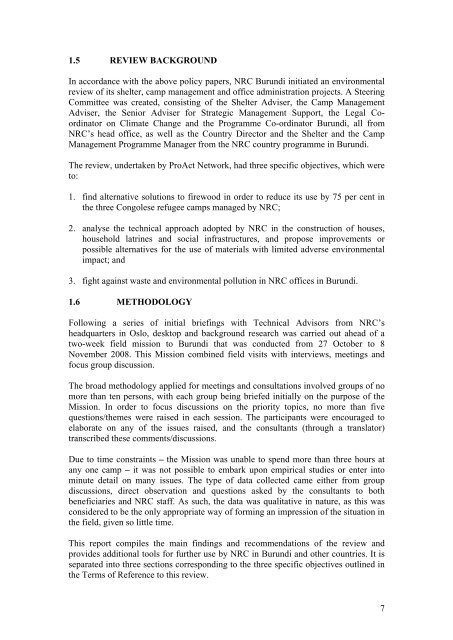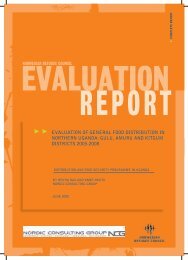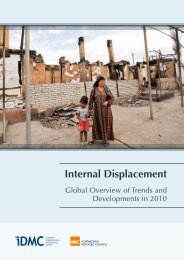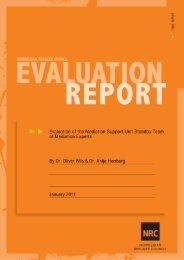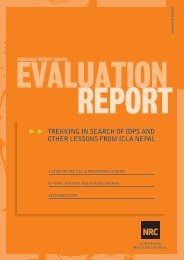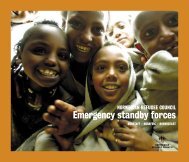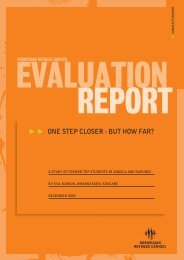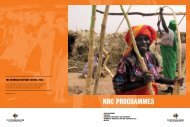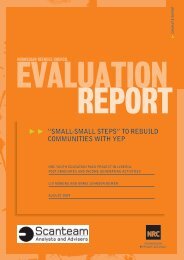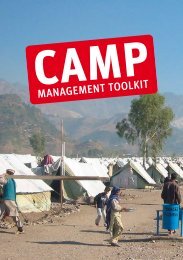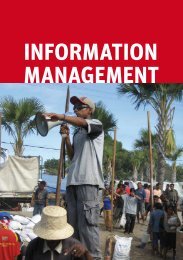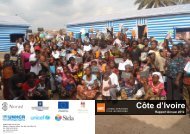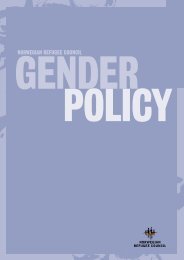Download full report - English version - ProAct Network
Download full report - English version - ProAct Network
Download full report - English version - ProAct Network
You also want an ePaper? Increase the reach of your titles
YUMPU automatically turns print PDFs into web optimized ePapers that Google loves.
1.5 REVIEW BACKGROUND<br />
In accordance with the above policy papers, NRC Burundi initiated an environmental<br />
review of its shelter, camp management and office administration projects. A Steering<br />
Committee was created, consisting of the Shelter Adviser, the Camp Management<br />
Adviser, the Senior Adviser for Strategic Management Support, the Legal Coordinator<br />
on Climate Change and the Programme Co-ordinator Burundi, all from<br />
NRC s head office, as well as the Country Director and the Shelter and the Camp<br />
Management Programme Manager from the NRC country programme in Burundi.<br />
The review, undertaken by <strong>ProAct</strong> <strong>Network</strong>, had three specific objectives, which were<br />
to:<br />
1. find alternative solutions to firewood in order to reduce its use by 75 per cent in<br />
the three Congolese refugee camps managed by NRC;<br />
2. analyse the technical approach adopted by NRC in the construction of houses,<br />
household latrines and social infrastructures, and propose improvements or<br />
possible alternatives for the use of materials with limited adverse environmental<br />
impact; and<br />
3. fight against waste and environmental pollution in NRC offices in Burundi.<br />
1.6 METHODOLOGY<br />
Following a series of initial briefings with Technical Advisors from NRC s<br />
headquarters in Oslo, desktop and background research was carried out ahead of a<br />
two-week field mission to Burundi that was conducted from 27 October to 8<br />
November 2008. This Mission combined field visits with interviews, meetings and<br />
focus group discussion.<br />
The broad methodology applied for meetings and consultations involved groups of no<br />
more than ten persons, with each group being briefed initially on the purpose of the<br />
Mission. In order to focus discussions on the priority topics, no more than five<br />
questions/themes were raised in each session. The participants were encouraged to<br />
elaborate on any of the issues raised, and the consultants (through a translator)<br />
transcribed these comments/discussions.<br />
Due to time constraints the Mission was unable to spend more than three hours at<br />
any one camp it was not possible to embark upon empirical studies or enter into<br />
minute detail on many issues. The type of data collected came either from group<br />
discussions, direct observation and questions asked by the consultants to both<br />
beneficiaries and NRC staff. As such, the data was qualitative in nature, as this was<br />
considered to be the only appropriate way of forming an impression of the situation in<br />
the field, given so little time.<br />
This <strong>report</strong> compiles the main findings and recommendations of the review and<br />
provides additional tools for further use by NRC in Burundi and other countries. It is<br />
separated into three sections corresponding to the three specific objectives outlined in<br />
the Terms of Reference to this review.<br />
7


